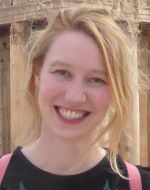
Can you talk about the journey to get to where you are now?
I am currently a CMA® (Certified Management Accountant) course provider at the Vrije Universiteit (VU) Amsterdam, in addition to my job as a Ph.D. candidate at the same university. When I was still studying, I worked for the same review course at the VU as a student and in one way, I never really left. I fulfilled some internships and kept working at the university for the executive Master’s in Finance and Control, where I also worked on my Ph.D. dissertation. But I always remained involved with IMA as a volunteer. I enrolled in the CMA program, became more active in the chapter, and am currently fulfilling the role of vice-president (and president-elect) of the chapter. The moment you get involved with volunteering and you enjoy it, the opportunities are endless. I joined the Councils and Global Components Roundtable, a global subcommittee that provided the Global Board of Directors with perspectives on member relations from a very global view. And starting July 1, I will be on the Global Board myself.
Why did you decide to take on the CMA program?
I accidentally “rolled into” the CMA program. I was studying for my Master’s in Accounting and Control and Dutch criminal law when I worked at the CMA program at the VU in Amsterdam. I had the perfect opportunity to join the review course at the VU, and my boss supported me in passing the CMA exam. Not wanting to waste a great opportunity, I decided to take the exams. I didn’t realize how much it would change my career afterwards.
What should finance professionals do to stay relevant in a changing world?
My personal interest is sustainability in finance. I think that finance professionals should really focus on what this means to them and their organization. It means that the approach these professionals have towards their own position and their organization should become much broader. An organization is not able to act and think in an integrated manner when everyone is working from their own silo. And because, traditionally, finance professionals play an important role in the accountability of the organization, they can definitely give a boost to this process within their organization.
What has been your biggest challenge during this time?
Honestly, I usually don’t see challenges. It might sound cheesy, but whenever anything changes, I consider it an opportunity to change and adapt. And it’s not only an opportunity, but it is more of a necessity. So, I usually just go with the flow and try to stay on top of developments. This is also the case for my research topic for my Ph.D. (Integrated Reporting), as organizations can see this form of integrated reporting (and thinking and acting) as a huge challenge, which costs a great deal of money, time, and effort without direct returns. But as society is changing and accountability is becoming more important, it is not just a challenge. It is an opportunity to show what you are doing to maintain your organization relevance for the long term—not only financially, but on every capital.
What is the best thing about being a CMA?
What I personally love is being part of the broader IMA community. Even before you earn your CMA credential, you become part of this professional, global organization that focuses on the important aspects of your job. Being part of the community helps you to keep up to date with relevant developments in the field. Besides, I think IMA has a unique way of operating with such a broad network of volunteers around the world. It is amazing to see how one organization can motivate so many people globally to go through great lengths to strengthen their profession in their country. Being able to volunteer within this organization myself and being able to motivate others to do so as well is the best thing I can think of about being a CMA!
How does the digital transformation impact your role?
As a course provider, you need to stay up to date with the current profession, as you are the one preparing the candidates for the next steps in their career. So, the digital transformation mostly requires us as course providers to keep on looking forward and trying to stay ahead of what is coming, in order to be able to deliver candidates who are future-ready.
What is your role within IMA Europe?
I have been active in the IMA Amsterdam Chapter for a long time now. I always enjoyed volunteering for the chapter, in any role possible. It is great to see so many familiar faces during the chapter events and to share knowledge and experiences. We usually do not have an issue with recruiting speakers for our events, so that also helps a lot in organizing them. Currently, in addition to being president-elect of the Amsterdam Chapter, I am a member of the Councils and Global Components Roundtable, which provides IMA with global insights and experiences of chapters worldwide. We are always trying to share and distribute best practices in order to make sure that every chapter can make the most out of their possibilities.
Starting July 1, I will serve a two-year term on the IMA Global Board of Directors. Being involved with IMA for such a long time and having volunteered in many of the different roles makes this something I am really looking forward to!
